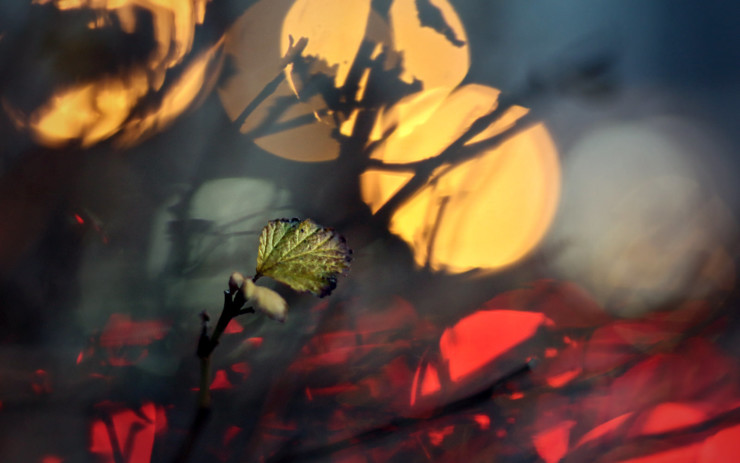
“But I can’t write poetry!” you tell me. I know, I know, you sweet thing. Me neither. Let’s just you and I talk about the greatest season of all time: fall. Some call it autumn. Tell me about what you notice when autumn happens. You know, leaves turning into fire, football games, air so crisp and clear like the first bite of a Jonathan apple you just picked off a tree. Tell me about all of it, just not the part about Pumpkin Spice Lattes, because Honey, I don’t like ’em. Can we still be friends? I have a good Pumpkin Whoopie Pie recipe in exchange for no talk of the PSLs.
OK, so fall. Tell me about it. I’m just going to write what you say down on these sticky notes and slap them up on a piece of paper. No, no, we’re not writing poetry. I just like to categorize what you’re saying into groups according to the five senses. We’re just doing a little organizing, is all.
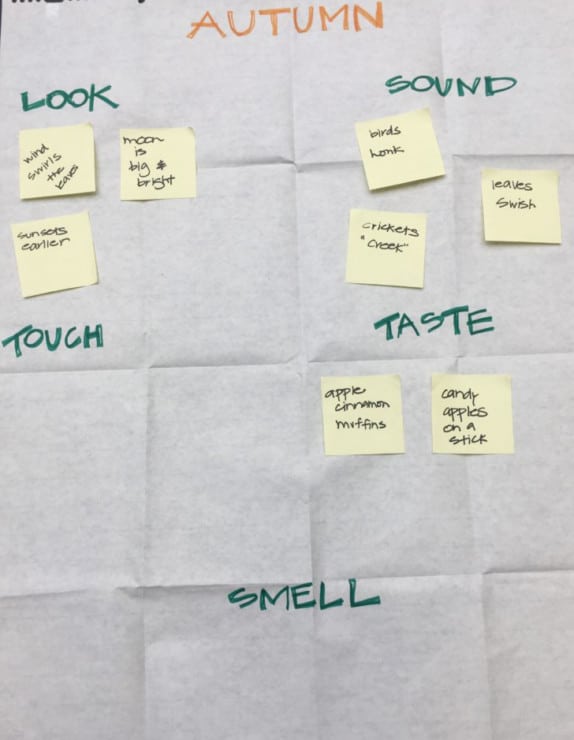
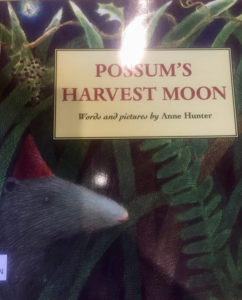
This is a story about a possum who is struck by the moon one evening during harvest, so big and bright, and he decides there is nothing to do but throw a party. So he does (see his party hat?), and he invites all his friends, but they’re too busy getting ready for winter they say they can’t make it.
Poor Mr. Possum.
“He is sad,” some of my six-year-olds observed when I read this story to them.
“He IS sad,” I said back.
“Why don’t the animals want to go to the party?” they asked, their sweet shoulders shrugging and their palms raised to the ceiling.
“Work,” I replied, and shook my head apologetically.
Those six-year-olds don’t understand that. You see something magnificent: a stop sign, a bus, the leaves swirling to the ground from a branch, and you do something – point it out, jump for joy because you’ve spotted a red octagon, scream, “The trees are ready for winter!” as you run down the street, your arms outstretched, utterly rapturous because the leaves have fallen for you and for everyone and they are bare and waiting for snow.
What happens to us that we catch our breath at a leaf so red we see hints of purple, but then shrug it off? We can’t write that down, we can’t take a picture, we can’t celebrate it, because then it’ll mean something and what if it doesn’t mean something to someone else? We decide it isn’t worth it to sit with the wishing that made us pause in the first place. It’s too hard.
“They should go to the party,” the six-year-olds all agreed.
They do. The animals are on their way to hibernation, but they see the moon, and are literally stopped in their tracks by it’s beauty. Work? Preparation? Never mind that. Eat! Drink! Be merry! Surely we’ve never seen anything like this before!
We know just the place to go! Everybody! Bring your party hats!
These reckless animals make you see the season a little differently, don’t they?
What’s that? You want to talk more about autumn? You want to describe a harvest moon? OK. You keep talking. I’ll write. And when you’re done, I’ll just see what it is you’ve collected here. No, no. I’m not going to write any poetry. Let’s just call it re-arranging. I promise I won’t write a poem.
You already did that.
Recipe for a “No-Write” Poem (kind of like a no-bake pie):
You’ll need:
2 pieces of paper
1 pack of post-its
1 pen or pencil
Something to read
Directions:
1. Divide one piece of paper into fifths for the five senses.
2. Think of a topic: fall, pens, flip-flops, coffee, your best friend.
3. As fast as you can, write down everything that comes to mind when you think of this topic.
4. Put your observations into the categories on your five sense paper. Can you fill out all five? Try to keep going until you can.
5. READ. Read an essay, picture book, part of a novel that has to do with that topic (or not, you’ll be surprised where you’ll find ways into your writing).
6. Write some more observations on the sticky notes. Describe that harvest moon.
7. On the second sheet of paper, re-arrange all your sticky notes so they make a poem. Alternatively, do this with a friend, and arrange her observations on a piece of paper, and show her what you came up with.
8. If you want, re-write it, title it, and hang it on your wall.
See? That wasn’t so bad. OK, fine. Go get that Pumpkin Spice Latte. You deserve it.
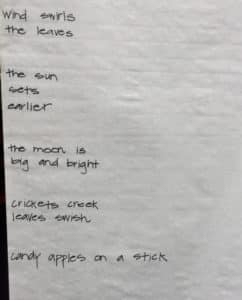
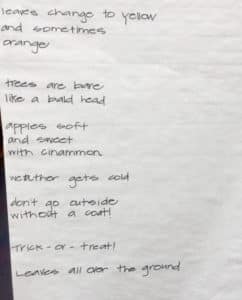
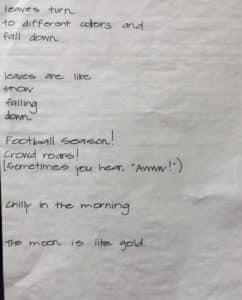
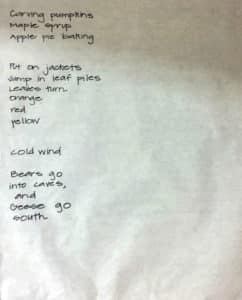
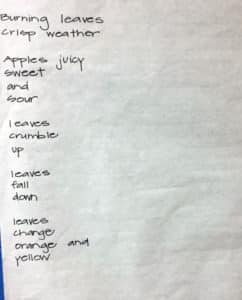
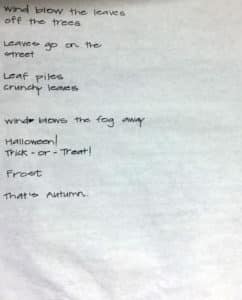
Note: the included poems were direct phrases and descriptions from the Kindergarten and first grade classes I tell stories to. They wrote the moon, I just hung it for them to see.
Photo by Gabriel Caparó, Creative Commons, via Flickr. Post by Callie Feyen. This post is a modified reprint of an article that first appeared at calliefeyen.com and is reprinted with permission.

“How to Write a Poem is a classroom must-have.”
—Callie Feyen, English Teacher, Maryland
- Poetry Prompt: Courage to Follow - July 24, 2023
- Poetry Prompt: Being a Pilgrim and a Martha Stewart Homemaker - July 10, 2023
- Poetry Prompt: Monarch Butterfly’s Wildflower - June 19, 2023
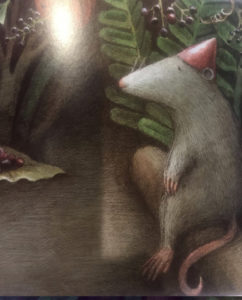
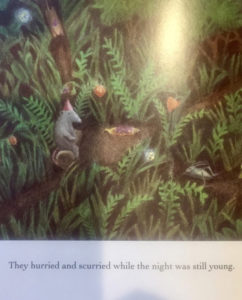
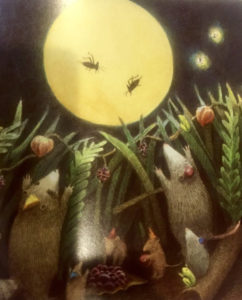
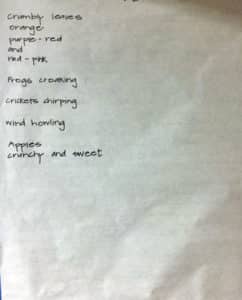
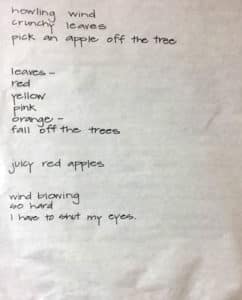
Megan Willome says
I love how this simple exercise takes the fear factor out of writing poetry.
Callie Feyen says
Thank you, Megan!
Bethany R. says
What a beautiful way to make poetry more approachable for young and old(er) alike.
Callie Feyen says
Thanks, Bethany! I wanted to do something simple, and take away the worry of how to spell, how to write, etc. I just wanted the kids to enjoy describing fall. 🙂
Bethany Rohde says
I want to try this out at homeschool this week! Fun way to play with words. Thanks again, Callie. 🙂
Bethany R. says
Also, how poingant and accurate here concerning what we frame with our art (or don’t). “What happens to us that we catch our breath at a leaf so red we see hints of purple, but then shrug it off? We can’t write that down, we can’t take a picture, we can’t celebrate it, because then it’ll mean something and what if it doesn’t mean something to someone else?”
Katie says
Anne Hunter’s books are wonderful. Love her “What’s in the Meadow?”, . . .Under the Log?, . . .in a Pond, . . .in a Tide Pool? books:)
Katie says
Callie Cinquain
Teacher
knows just how to
throw a FUN word party
ask them questions, write down answers
“Voila!”
Callie Feyen says
Well, that’s wonderful! Thank you!
Katie says
You’re more than welcome, Callie:) Thank you for teaching intelligently!
Here’s another I wrote:
Poem Party
Paper
pen and post-its
find a great read aloud,
now then, brainstorm, observations
word play:)